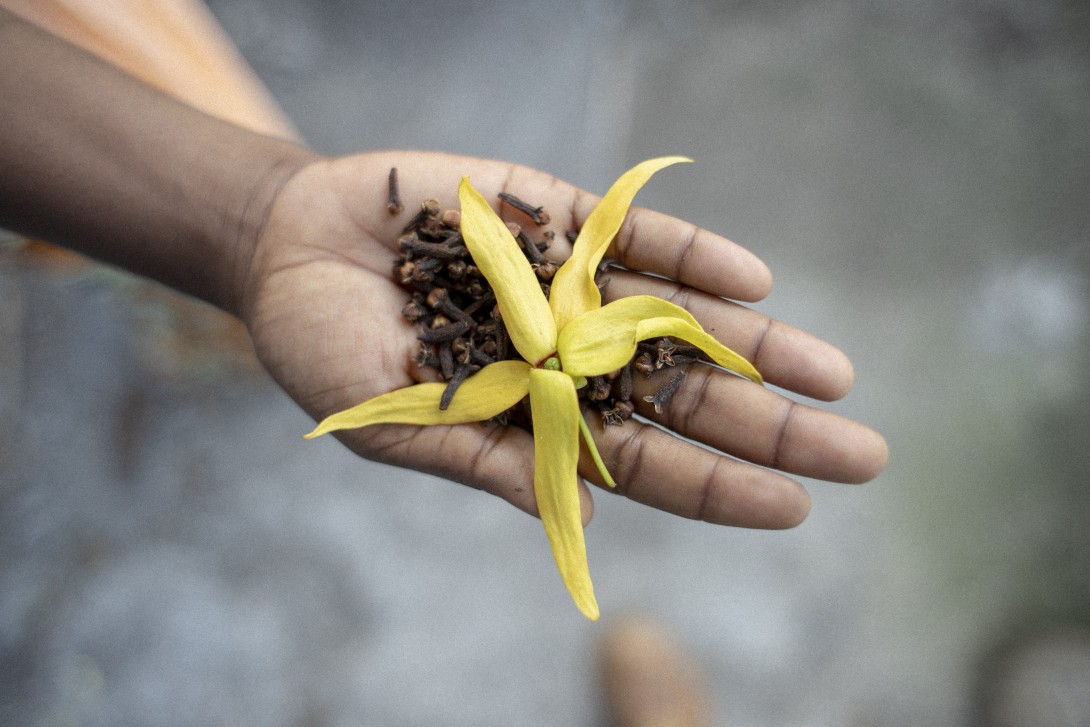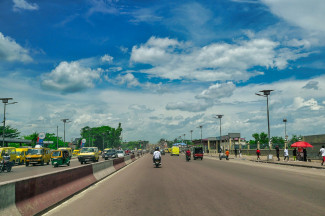In Comoros, an essential oils doyenne has plans for her country’s unique yields
Bottles of varying sizes were filled with scents, serums, potions and lotions – all made with Comoros-grown items that were refined, blended, and packaged in Comoros.
Sitting in Ibrahima Sittina Farate’s sparse living room amid an afternoon downpour, her Biozen-branded products were lined up on a side table: she described the ingredients in each one and their unique, therapeutic properties.
Having studied agronomy at the University of Madagascar, her business is creating what she calls “biocosmetics,” specialty items perfumed with ylang-ylang, infused with cloves and tinged with vanilla. Those components are also her country’s specialty – high-value export crops – but she is putting them to many new uses.
“I want to do things differently. Just because we’ve been doing something for hundreds of years doesn’t mean we should continue to,” she said. “Why can’t we change?”

After graduating, she returned home and to her family’s ylang-ylang fields. Her father had been harvesting the flowers and selling them to distillers. She asked him why they didn’t process them into essential oil themselves.
That is when her business started in 2015, and she is now an expert in the entire ylang-ylang process: from picking the raw flowers to perfuming the human body, innovating with what she is producing on very limited means.
Handing over a plastic bottle of liquid smelling vaguely of ylang-ylang, she said, “Hydrolat, which is like flower water, is created during distillation along with the ylang-ylang oil. People frequently just waste it by letting it run back into the ground. I keep all the byproducts and use them.”
“You have likely used hydrolat without knowing it. If you have used shampoo or body lotion, then definitely there was hydrolat in it.”

She makes a spritz of ylang-ylang water as well as using hydrolat in the vanilla lotion she produces. Following support from the Enhanced Integrated Framework (EIF), the United Nations Development Programme and the International Trade Centre with distillation equipment, packaging materials and branding, she hopes she can catalyze her business, her brand and her markets.
“I sell the essential oil I produce at my distillery to a middleman, who sells it to a French perfumery,” she said.
But, she hopes to sell her items directly to those abroad. Accessing those markets depends on certifications and export policy, among many outside factors.
With the Government of Comoros focusing on lifting up its agricultural sector –especially so its high-potential, high-value ylang-ylang, vanilla and cloves – the foundation is in place for entrepreneurs like Sittina to succeed. Next is access to financing and credit, and the easing of markets.
Down a lush, lava-rock filled road outside Moroni sits Sittina’s distillery, amid her three hectares of ylang-ylang trees. She describes the distillation process and what other plants she wants to employ in her products.

She is also aware that what her land is now providing is no guarantee into the future, conscious of dwindling resources and the need for sustainable production. Currently, she uses the wood of mango trees growing on her land, but is concerned that in a few years there may not be enough. So, she is already thinking and planning.
“Deforestation is happening in Comoros because everyone needs wood to distill ylang-ylang. I have a plan to use solar panels to feed the distillation system instead of it being wood-fired, but that will be expensive. But with those panels it should provide enough energy for the whole village here,” she said.
“Ideally we could mobilize the community to purchase the solar system together.”

It is this community-oriented thinking that has brought her this far. For the people that make up the three islands of Comoros, similar planning and partnerships is what will take the country’s trade – and with that its economy and its people – to the next level.
Header image of a COVID-19 islolation center in Bole-Chefe, Ethiopia - ©UNICEF Ethiopia/2020/Mulugeta Ayene via Flickr Creative Commons Attribution-NonCommercial-NoDerivs 2.0 Generic (CC BY-NC-ND 2.0) license.
If you would like to reuse any material published here, please let us know by sending an email to EIF Communications: eifcommunications@wto.org.


